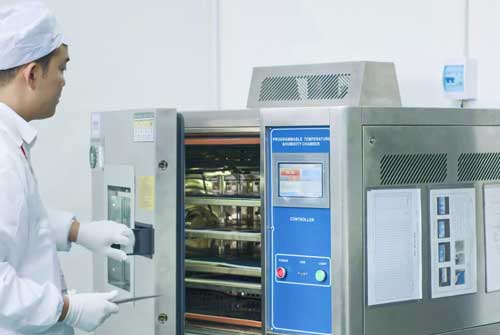what does the ah on a battery mean?
What does ‘Ah’ on a battery mean, Your phone, computer, laptop, car, and even home power sources are all equipped with batteries. But have you ever thought about the numbers and ratings on them, like 5Ah or 10Ah? What does ‘Ah’ mean on a battery? In simple terms, ‘Ah’ or ampere-hour represents the amount of energy a battery can store when a current of 1 ampere flows through it for 1 hour. High-capacity batteries have higher ‘Ah’ values, which means they can provide power to devices for a longer time. Sungold is a professional solar manufacturer that offers portable solar panels in different sizes, paired with batteries or energy storage solutions that have varying battery capacities. Durable and high-capacity batteries can provide extended charging time for appliances before running out of power. In this blog post, we will discuss the meaning of ‘Ah’ in detail.”
What is the Ampere-hour (Ah)?
Ampere (Amps) is the rate of electron flow through an object or conductor. The larger the current, the greater the volume of electrons passing through the conductor.
On the other hand, Ampere-hour (Ah) is a unit that balances battery capacity. The rating balances the amount of current a battery can provide at a specific rate over a specific period of time. Milliamp-hour is one-thousandth of an Ampere-hour and is commonly used to indicate the battery capacity of small devices.
Understanding the key role of ‘Ah’ is crucial to understanding how long a device can operate after a single charge.”
Using ‘Ah'”
Translation: “In typical scenarios, you would use Ampere-hours when reducing the nominal voltage of an electrochemical system, such as electroplating. These devices directly observe the relationship between electroplating thickness and integrated current over a specific time period. Ampere-hour meters are used to measure ‘Ah’ ratings and assess the quality and reliability of the electroplating process.
What does ‘Ah’ on a battery mean?
What does ‘Ah’ on a battery mean,Ah’ or Ampere-hour depicts the rechargeable capacity of a battery. This rating helps users understand how many amperes of current the battery can provide within one hour.
For instance, a fully charged 10Ah battery can provide a current of 10 amperes for one hour. If a device requires a current of 1 ampere to operate, then the fully charged battery would be able to power it for ten hours.
However, it’s important to note that this occurs under ideal conditions. Variations in temperature and weather conditions can lead to differences in the device’s operational time.
Battery Capacity”
Battery capacity is a measure of the charge stored in a battery, measured in Ampere-hours. Below are the typical battery capacities and voltages for different cylindrical AA batteries.
How to calculate ‘Ah’ on a battery
“If you theoretically understand what ‘Ah’ means on a battery, now it’s time to grasp how to calculate it.
The mathematical representation of Ampere-hours is: Ampere-hours (Ah) = Current (I) × Discharge Time (T). Let’s say you have a battery that draws about 50 amperes and discharges within 1 hour. To calculate Ampere-hours, follow these steps: Ampere-hours = 50 A × 1 H = 50 Ah in one hour.
Let’s take another example for better astronomical understanding. Suppose a battery draws 60 amperes and discharges for 0.5 hours or 30 minutes. In this case, Ampere-hours would be: Ampere-hours = 60 A × 0.5 H or 30 A × 1 H = 30 Ah in one hour.
In the first example, the battery would provide 50 Ah in one hour. In the second scenario, the battery drawing 60 amperes would provide 30 Ah in one hour.
Batteries with lower Ampere values tend to deplete faster, leading to shorter lifespans. Therefore, purchasing batteries with higher ‘Ah’ ratings is an ideal choice.”
Understanding the ‘Ah’ Rating
There are typically many different Ampere-hour (Ah) ratings, and when comparing batteries, you need to look at the Ampere-hour rating on the battery. Deep cycle batteries will display an Ah rating on the battery. If you can’t find an Ampere-hour rating, it’s likely a starting battery and not intended for continuous power supply.
Generally, high-rated batteries have more electrolyte and high-activity electrodes. For instance, the rating for a standard AAA battery is lower than that of a lithium-ion car battery. There are various battery Ampere-hour options available, among which some common ones include: 50Ah 100Ah 200Ah
It’s better to opt for batteries with a slightly higher ‘Ah’ rating to charge your devices, as it extends the margin rather than risking having too small a margin. You wouldn’t want to run out of power unexpectedly because you chose a 200Ah battery when you needed a 250Ah battery.”
Does a higher Ah value mean a larger battery capacity?
In short, not necessarily. While higher Ampere-hour (Ah) values don’t automatically mean a more powerful battery, sometimes they can indeed equate to more energy storage. Batteries with higher Ah values often have a larger quantity and density of cells providing current, along with larger conductor and component specifications, enabling more current to flow with less resistance. Higher Ah also means you’ll be able to power more devices for a longer time while putting less stress on the battery components. Lighter workloads can have an impact on the battery’s overall lifespan. Batteries come with intricacies.”
2Ah compared to a 5Ah battery
I am combining five battery cells (3.6V, 2Ah each) to create an 18V (or up to 20V max), 2Ah battery. These battery cells are connected in series, maintaining their Ampere-hour rating and combining the voltage. In this case, the battery is rated at 18V and 2Ah.
However, we are linking two separate packs of five cells each (3.6V, 2.5Ah). Then, each pack of five cells is connected in parallel to create a battery with a voltage of 18V and a capacity of 5Ah. As the battery cells are connected in parallel, their Ampere-hour ratings add up, reaching 5Ah.
Higher Ampere-hour ratings do not necessarily mean higher power, but larger batteries do provide slightly more power. This is because, in a 10Ah battery, there are 10 individual cells at work. Hence, it can provide a sustained and stable power supply to devices.”
Understanding Sungold’s ‘Ah’ Ratings
AC Current and DC Current are measurements of current flowing through a circuit. However, the distinction lies in the direction of the current flow.
DC Current refers to the current flowing in only one direction. On the other hand, AC Current changes direction as it goes from the positive (+) pole to the negative (-) pole and then returns.
Batteries are always DC. Hence, they are equipped with inverters to convert the electrical energy into a usable form.
Here are popular combinations of portable solar panels and energy storage with pure sine wave inverters:
4x100w hi-power portable solar panel paired with 3kWh high-capacity energy storage. It can power approximately 99% of outdoor appliances and comes with smart app control for enhanced power efficiency. Additionally, it boasts a 70Ah rating, ensuring prolonged device powering.
4*50w winner bag portable solar panel paired with 2kWh high-capacity energy storage. With a 50Ah rating, this lithium-ion battery can charge around 96% of household or outdoor appliances. Moreover, it features dual battery protection chips for safe charging.
2*50w spc portable solar panel paired with 1.5kWh portable energy storage, featuring two USB-C ports, three 1800W AC outlets, dual PD100W, and a car charger. Hence, it can meet basic household power needs.”
FAQ:
Q: Is a higher Ah battery better?
A: A high Ah battery rating does not mean it is more powerful. Instead, it means there is a high number and density of cells providing current. When the electrical current moves with less resistance, it produces a little more power.
Q: Does higher Ah mean more power?
A: So in addition to having double the cells, the 5.0Ah battery also has a higher energy density in each one. In general, higher amp hours mean more runtime and higher voltage means more power.
Q: Does the Ah on a battery make a difference?
A: In a broader sense, the amp hour rating does tell us a little bit about the battery’s capacity. For instance, a battery with a 10 Ah rating will last twice as long as a battery with a 5 Ah rating when used under similar conditions, but it does not mean that it will actually last 10 full hours
Learn more about it:
What does amp mean: A Beginner’s Guide
What Is mAh: A Beginner’s Guide
Electricity Uncovered: Volts to Watts Conversion
Explanation of Watts vs Watt hours, Amp hours vs Watt hours

























